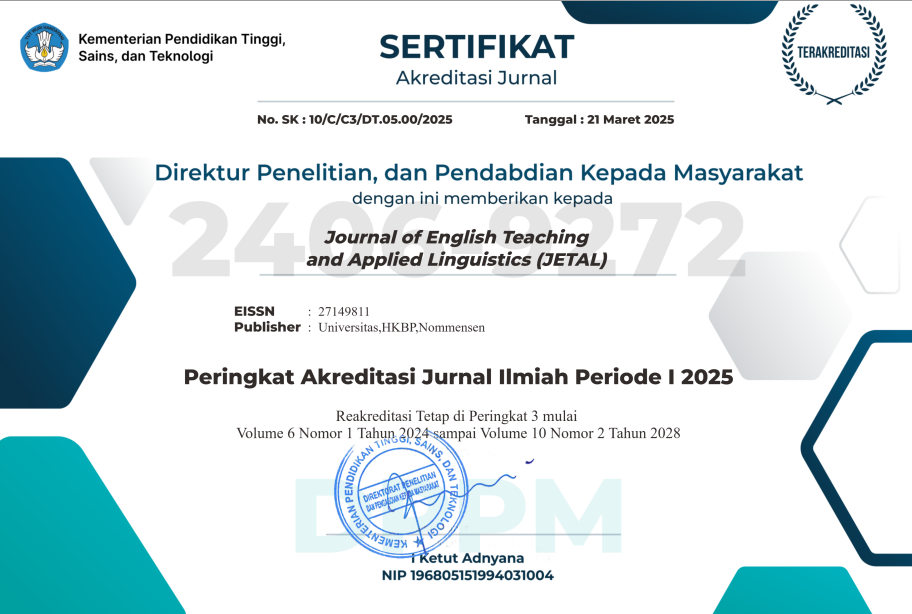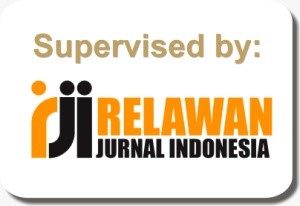FILIAL PIETY CONTAINED IN FACE THREATENING ACTS IN DORAEMON AND KOBO CHAN: A MANGA ANALYSIS
Abstract
Filial Piety is a value rooted form Confucianism. This value demands one to respect parents. As this value spreads widely in East Asia, this study aims to investigate what filial piety values contained in Doraemon and Kobo Chan, and to examine which same filial piety values shared in both comic books. Doraemon and Kobo Chan are chosen since these two comic books are originated from Japan whose society adopts filial piety. These two comic books are important to be studied since the two were highly popular in Indonesia in the late 1990’s and early 2000’s and were enjoyed by many Indonesian children. This study found that acquiescent respect and care respect are two values having the highest numbers of appearances in Doraemon and Kobo Chan, respectively. While the values contained in both comic books are acquiescent respect and respecting the ancestors. It is hoped that future studies could examine the relation between these values contained in both comic books and Indonesia’s young generation’s decision to take a role as a sandwich generation.
References
North-West University].
Akiko, W. (2011). The influence of parenting on children’s academic achievement: Comparison between the United States and Japan [Internet] [Thesis]. California State University (pp. 1–72). Retrieved from https://scholarworks.calstate.edu/downloads/fj236257r.
Astika, A. Elsha. (2020). Politeness Strategies of the Stepmother Character in 1950’s and 2015’s Cinderella Movies [Internet] [Thesis (Sarjana)]. [Universitas Brawijaya]. Retrieved from http://repository.ub.ac.id
Ayu, E.A. (2018). Politeness strategies of the stepmother character in 1950’s and 2015’s Cinderella movies. [Thesis, Universitas Brawijaya].
Bornstein, M. H. (2008). Handbook of Parenting: Volume 4 Social Conditions and Applied Parenting. Retrieved from https://books.google.co.id/books?hl=en&lr=&id=nfP9dKYn73cC&oi=fnd&pg=PA59&dq=parental+advice+japanese+children&ots=lSyEohlGSk&sig=g4KqLLds5N-pYvTSBdVt82B_CcE&redir_esc=y#v=snippet&q=continue%20to%20seek%20their&f=false
Canda, E. R. (2013, October). Filial piety and care for elders: A contested Confucian virtue reexamined. Journal of Ethnic and Cultural Diversity in Social Work, 22(3–4), 213–234. https://doi.org/10.1080/15313204.2013.843134
Chisholm, J. F. (1999, January). The sandwich generation. Journal of Social Distress and the Homeless, 8(3), 177–191. https://doi.org/10.1023/A:1021368826791
Ensiklopedia Dunia. (2023). Retrieved from
https://p2k.stekom.ac.id/ensiklopedia/Kobo_Chan
Fetterman, D. M. (1987). Qualitative approaches to evaluating education. School of Education Stanford University, 20–24. Retrieved from https://files.eric.ed.gov/fulltext/ED284874.pdf
Fujiko & Fujio, F. (1969). Doraemon. Retrieved from https://mangareader.to/doraemon-160
Fujiko & Fujio, F. (1969). Doraemon. Retrieved from https://chapmanganato.com/manga-os952775
Kartikasari, W. (2018). The role of anime and manga in Indonesia–Japan cultural diplomacy. Muhammadiyah university of Yogyakarta, 13, 41–47.
Kobo, C. (2023). Pusat ilmu pengetahuan | Unkris [Internet]. Retrieved from https://p2k.unkris.ac.id/id3/1-3065-2962/Kobo-Chan_33959_p2k-unkris.html
Koyano, W. (1989). Japanese attitudes toward the elderly: A review of research findings. Journal of Cross-Cultural Gerontology 4, 335-345.
Luo, Y., Wu, X., Liao, L., Zou, H., & Zhang, L. (2022). Children’s filial piety changes life satisfaction of the left-behind elderly in rural areas in China? International Journal of Environmental Research and Public Health, 19(8), 4658. https://doi.org/10.3390/ijerph19084658
MacLean, M. J., Wister, A., & Gutman, G. (Eds.). (1998). Health systems and aging in selected Pacific Rim countries: Cultural diversity and change. Canadian Journal on Aging / La Revue canadienne duvieillissement. Gerontology Research Centre, Simon Fraser University, 1999;18(1):107–10.
Maeda, D. (2004, September). Societal filial piety has made traditional individual filial piety much less important in contemporary Japan. Geriatrics and Gerontology International, 4(s1), S74–S76. https://doi.org/10.1111/j.1447-0594.2004.00156.x
Mu, R. (2010). Encouraging the practice of filial piety through designed objects [Internet] [Thesis]. University of Michigan (pp. 1–69). Retrieved from https://deepblue.lib.umich.edu/handle/2027.42/78092
Palmore, E. (1975). What can the USA learn from Japan about aging?. Gerontologist, 15(1 Pt 1), 64–67. https://doi.org/10.1093/geront/15.1_part_1.64, pp. 64-67. Retrieved from https://academic.oup.com/gerontologist/article/15/1_Part_1/64/564141#google_vignett
Putro, S. S., & Riyanto, S. (2020, June). How Asian Sandwich generation managing stress in telecommuting during Covid-19 pandemic. International Journal of Scientific Research and Engineering Development, 3(3), 485–492.
Roberts, J. (1991). Face-Threatening acts and politeness theory: Contrasting speeches from supervisory conferences. Education Resources Information Center [Internet] (pp. 1–23). Retrieved from https://files.eric.ed.gov/fulltext/ED332354.pdf.
Sappor, G. (2021). A Comparative Study of Filial Piety in Beijing and the UK. Journal of Education and Culture Studies, 5(1), p22. https://doi.org/10.22158/jecs.v5n1p22
Schilling, M. (1993, December). Making dreams come true. Doraemon, 40(4), 405–417.
Stemler, S. (2001). An overview of content analysis. Practical Assessment, Research and Evaluation. 7(17), 1–6. Retrieved from https://scholarworks.umass.edu/cgi/viewcontent.cgi?article=1100&context=pare
Sung, K. T. (1998). An exploration of actions of filial piety. Journal of Aging Studies. 12(4):, 369–386. https://doi.org/10.1016/S0890-4065(98)90025-1.
Sung, K. (2001, March). Elder respect: Exploration of ideals and forms in East Asia. Journal of Aging Studies, 15(1), 13–26. https://doi.org/10.1016/S0890-4065(00)00014-1
Sung, K. T., & Dunkle, R. E. (2009). How social workers demonstrate respect for elderly clients. Journal of Gerontological Social Work, 52(3), 250–260. https://doi.org/10.1080/01634370802609247
Sung, K. & Kim, H. S. (2003). Elder respect among young
adults: Exploration of behavioral forms in Korea. In Ageing International (Vol. 28, Issue 3). https://link.springer.com/article/10.1007/s12126-002-1008-y
Takagi, E., & Saito, Y. (2013). A longitudinal analysis of the impact of family support on the morale of older parents in Japan: Does the parent’s normative belief in filial responsibilities make a difference? Ageing and Society, 33(6), 1053–1076. https://doi.org/10.1017/S0144686X1200044X
Tamai, K., & Lee, J. (2002). Confucianism as cultural constraint: A comparison of Confucian values of Japanese and Korean University students. In International Education Journal (Vol. 3, Issue 5). Congress Issue. http://www.flinders.edu.au/education/iej
Teon, A., & Piety, F. (孝) in Chinese Culture [Internet]. (2016). The Greater China [Journal]. The Greater China. Retrieved from https://china-journal.org/2016/03/14/filialpiety-in-chinese-culture.
Ueda, M. (1982). Kobo Chan. PT Elex Media Komputindo.
Wang, Y., & Liu, X. (2021). Study on digital design of comic strip. Journal of Physics: Conference Series, 1802(3), 032097.Stemler. An overview of content analysis. https://doi.org/10.7275/z6fm-2e34
Authors retain copyright and grant the journal right of first publication with the work simultaneously licensed under a Creative Commons Attribution-ShareAlike 4.0 International License (CC BY-SA 4.0) that allows others to share the work with an acknowledgment of the work's authorship and initial publication in this journal.
Authors are able to enter into separate, additional contractual arrangements for the non-exclusive distribution of the journal's published version of the work (e.g., post it to an institutional repository or publish it in a book), with an acknowledgment of its initial publication in this journal.
Authors are permitted and encouraged to post their work online (e.g., in institutional repositories or on their website) prior to and during the submission process, as it can lead to productive exchanges, as well as earlier and greater citation of published work (See The Effect of Open Access).






